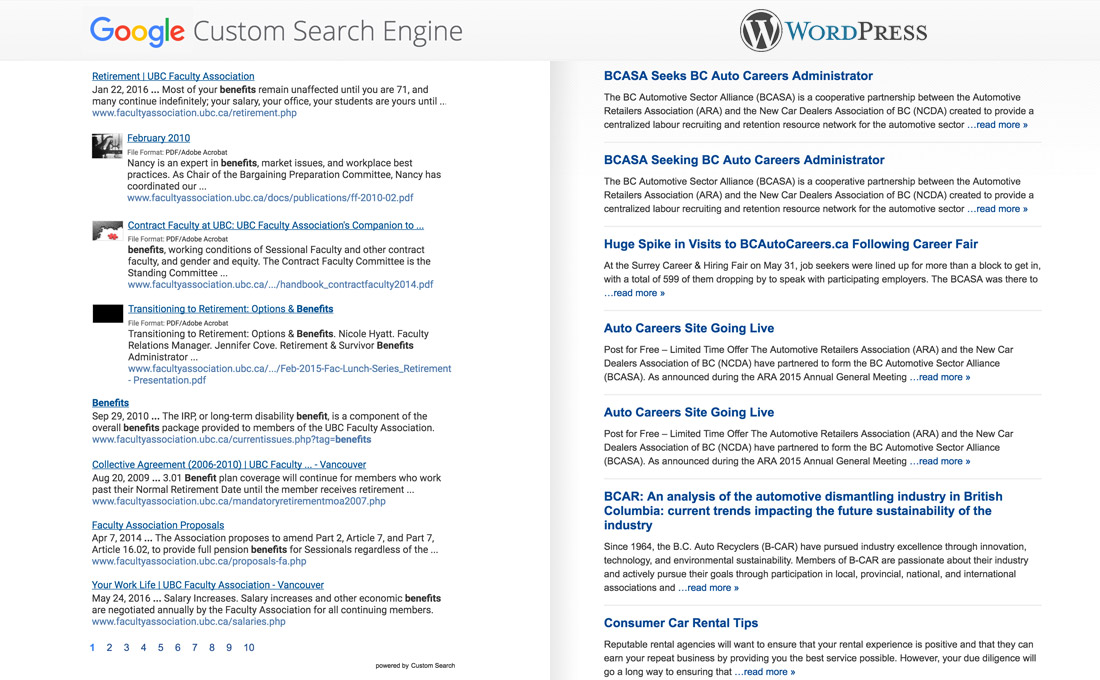KIMBO websites are known for their use of WordPress customization, but customization can often be used in an abstract, buzzword sense; it sounds good but it’s vague. To provide concrete evidence of the lengths we go to ensure specific site functionalities, here is a breakdown of the main options for a key component of any website: the search function.
Many people are under the impression that search functionality is consistent across all websites. However, there are several options to choose from when instituting a search bar on your WordPress website. Chief among these are the integrated WordPress search and Google Custom search. Below, we will look into the pros and cons of both, in an effort to help inform you about which search is appropriate for your own website.
WordPress Search
The WordPress content management system comes with a built-in search function, which is easily applied to any WordPress website. The primary differentiating factor for WordPress search is that search results are only located within the website, not on Google or any other search engine.
Pros
The internal indexing of WordPress search makes it ideal for personal or membership-based websites, so that information remains accessible only to those authorized to access it. Since the search is entirely internal, any updates you make to the website will be reflected in your search results immediately. This is great for really dynamic websites that change a lot and must relay these changes to users. Another great aspect of WordPress search is its styling potential. The search functionality can be styled to seamlessly match the look and feel of your website, including for responsiveness for tablets and mobile. Other perks for WordPress search include infinite scrolling of results so that users don’t need to click to the next page, and the ability to search your WordPress media library for images and PDFs.
Cons
While the internal indexing of WordPress search is great for when you need to be information restricted, it can hinder the spread of information to the public. Additionally, while WordPress search can search the titles of PDFs in your WordPress media library, it is unable to search the contents of the PDFs. This becomes an issue if website users frequently need to locate information inside those PDFs, or if there are many PDFs on the site.

Google Custom Search
Google Custom search is independent from WordPress, and is free to use and embed on your website. Unlike WordPress search, Google Custom search results are indexed on Google, making them accessible through any use of the Google search engine.
Pros
The public indexing of results with Google Custom search is great for businesses, freelancers, and other entities looking to spread awareness about their existence to potential clients, customers, and employers. Google’s reach means that anything on your website is accessible globally, which greatly increases the possibility of people stumbling upon your work. Another use of Google’s power that is part of the Custom search is the ability to search the contents of PDFs. This extends the possibilities of your search function in the case that your site has an extensive library of documents. Google Custom search also has the familiar Google format, and is less complex and difficult to integrate than WordPress search.
Cons
Google Custom search’s public indexing is great to spread awareness, but can be an issue if your website contains private/membership information. Another issue is that search results aren’t updated in real time. It will take approximately 2-4 weeks in order for Google to re-index your website, which may restrict accessibility to documents on ever-changing sites. The styling options are also far fewer, as the search function layout remains very similar to Google’s.
While something as integral as the search function may seem consistent across all websites, there are many differences between search options that can provide the specific functionalities to optimize the user experience of your website.
We implemented the Google Custom search most recently on our website design for the University of British Columbia’s Faculty Association (UBCFA). They have a sizeable archive of PDFs uploaded to their site, and the ability to search inside those PDFs to get at the rich content was very important to them. Be sure to take a look at that project here.


